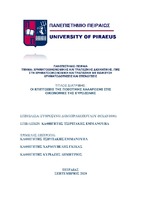Οι επιπτώσεις της ποσοτικής χαλάρωσης στις οικονομίες της Ευρωζώνης

Master Thesis
Συγγραφέας
Δημητρακοπούλου, Ευφροσύνη
Ημερομηνία
2020-09Επιβλέπων
Τσιριτάκης, ΕμμανουήλΠροβολή/
Λέξεις κλειδιά
Ποσοτική χαλάρωση ; ΕυρωζώνηΠερίληψη
Αντικείμενο της παρούσας διπλωματικής διατριβής είναι η ποσοτική χαλάρωση και πώς αυτή επιδρά στην πραγματική οικονομία στα πλαίσια της Ευρωζώνης.
Αρχικά γίνεται αναφορά στην έννοια της ποσοτικής χαλάρωσης (Quantitative easing - QE) η οποία συνίσταται στην νομισματική πολιτική κατά την οποία μια Κεντρική Τράπεζα παράγει χρήματα με την αγορά χρεογράφων, όπως είναι τα κρατικά ομόλογα. Σκοπός του συγκεκριμένου προγράμματος είναι η αύξηση της κατανάλωσης του ιδιωτικού τομέα αλλά και η ελεγχόμενη αύξηση του πληθωρισμού όταν δεν καθίσταται αποτελεσματικό το μέτρο της μείωσης των επιτοκίων (τη στιγμή που πλησιάζει το μηδέν) με σκοπό την ανάπτυξη της οικονομίας.
Κατ’ επέκταση αναλύεται η συμπεριφορά της Ευρωπαϊκής Κεντρικής Τράπεζας και πώς επιδρά η ποσοτική χαλάρωση στις χώρες της Ευρωζώνης αλλά και πώς επηρέασε η ανισότητα τη ζώνη του Ευρώ.
Τα αποτελέσματα της οικονομετρικής ανάλυσης αφορούν 18 χώρες την Ευρωζώνης και καλύπτουν την περίοδο από το 2000 έως και το 2019 και εξετάστηκαν 18 μακροοικονομικές μεταβλητές με σκοπό να φανεί τι επίδραση είχε η ροή χρήματος του προγράμματος στον χρηματοπιστωτικό κλάδο και κατά πόσο δημιούργησε συνθήκες ανάπτυξης την περίοδο της ύφεσης.


